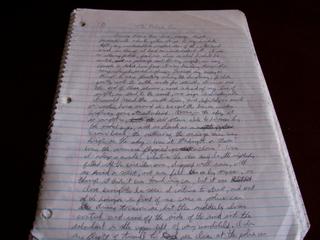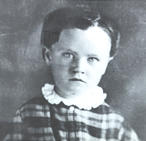Dreams

After being inspired by a local blogger, I have decided to include two of my most impressionable dreams I have dreamt during the night in the coziness of my bed. I wish to include only one dream for this post and will include another after discussion of this first dream. This dream may have taken place 3-5 years ago, but I can not pinpoint an exact date. I remember it as though it were last night’s dream. So, enjoy.
The following is transcribed from a handwritten, personal journal the morning after the dream.
Driving down a two lane, orange clayed pavement, with a double yellow stripe to my immediate left, my windshield is clear of all water and mud, as though I had no windshield at all. I see no steering wheel; feel no chair in which I shall be sitting, no passenger seat to my right, or any console to detect how fast I was traveling down the orange clayed, paved highway. Through my eyes, as though I were floating along the highway, fields gently roll to either side for eternity, never seeing the end of these plains. And, ahead of my line of sight, no end or turns to the road, no sign indicating when I would reach the next town, and definitely no soul or country horse close to me, except the barren country road that goes straight ahead.
Above, in the sky, it is nighttime, for all the stars are able to be seen by the naked eyes. And, as dark as a crow’s beak, the outline of the orange sun is also in the sky. Is it midnight or noon? Is the universe flipped up or down? Am I asleep or awake?
Whatever the case may be, the night sky filled with the sun, dripped with rain, with no sound or scent. Not even felt by my car, as though it didn’t even touch my car, the rain was still close enough to be seen.
I continue to drive/float, and out of the horizon in front me comes a police car, driving towards my direction. But, then suddenly, the police car loses control and runs off the road into an embankment in the upper left corner of my windshield. I slow my flight of travel to peer closer at the police car that was lying in the embankment. No movement inside or out. No flashing lights to be seen and no sirens to be heard, but I paid close attention to the pure, white color reflecting the sun’s rays. The blue print detailed the side paneling, and inscribed was: POLICE, in a modern font. I suddenly see out of the corner of my eye another police car coming from the horizon, and with lights flashing, chasing after the already wrecked police car that lies in the ditch. With no sirens sounding and no tires screeching, the silent rain falls silently on both the police cars.
By now, I have come to a stop to attempt to figure out why this second cop car was chasing after the first cop car. Suddenly, I noticed the difference between the two cop cars. The second cop car, stopped and blocking the road in front of me, has side paneling that says… “What does it say?...What does it say?”... I realize that it is cave like drawings, Indian calligraphy, or all nonsense to me.
The moment I notice the drawings from another time, the door swings open at me and out jumps an ancient Native American, appearing to be unaware of modern culture and untouched by modern times. With his dark-tanned, tall and athletic muscular physique, a sun tattoo shown on his left shoulder, for this is the side that was facing me. His rawhide garment covered his pubic area, strapped on with a leather rope wrapped around his waist. No shoes, but a warrior headdress looking to be ready for battle. His eyes peered, as thought he were ready to kill, at the wrecked cop car in front of him in the embankment. He raised his right arm, and in it gripped tightly and confidently, a tomahawk. Still, there was no sound, only the sense of sight. I see him run up to the police car in front of his, when the native flings open the driver’s door. All I see is, not the policeman sitting in the driver’s seat, but the tomahawk rising above the savage’s head and swinging up and down in a rhythmic motion. With each swing, the downward force grew more violent each time. With each swing, the rain continued to fall in the night sky with the sun looking on. And, with each swing, time froze on a two lane, orange clayed, paved road.

